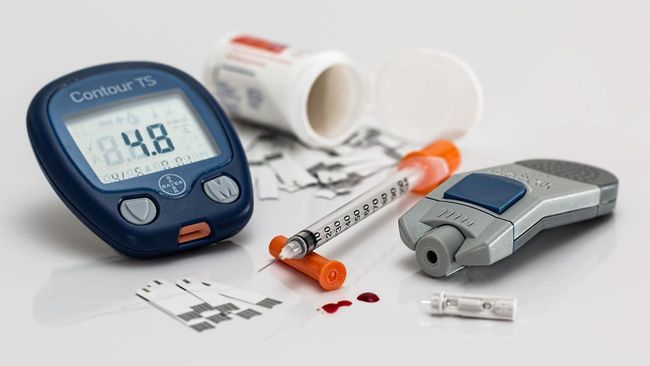Jakarta, CNBC Indonesia – Sugar seems to be one of the worst foodstuffs for the human immune system, especially during the Covid-19 pandemic. It is even known that most Covid-19 patients who are on ventilators have a series of inherited diseases, such as diabetes or diabetes, which make it more difficult to fight off the respiratory virus.
Dr. Heather Moday, an allergist and immunologist from the United States (US), said that research shows the SARS-CoV-2 virus can worsen blood sugar control in the short term.
This has the potential to make diabetics reach dangerously high blood sugar levels. This occurs when sugar binds to a receptor found on the beta cells of the pancreas, which produce insulin.
“As an allergist and immunologist, I often tell my patients that having diabetes means you’re in a low-grade chronic inflammatory state, which overloads the innate immune system and makes it slower to attack pathogens when they enter the body,” Moday says. CNBC International.
“When it comes to our immune system, what we eat is very important. And there is no ingredient that is more detrimental to your health and immune system than sugar, especially in times of Covid,” he explained.
Moday explained that people should reduce their consumption of large amounts of sugar, especially if the patient has been diagnosed with prediabetes or diabetes.
“Consuming too much sugar starts a vicious cycle of insulin resistance and obesity, which pushes inflammatory cytokines, damages blood vessels, and activates the immune system to repair these areas,” he explains.
This condition can be a major nuisance to the immune system as it opens the way for harmful bacteria and viruses to sneak through the human body’s defenses.
Sugar itself is in many food products, not only sweet foods such as donuts, candy, cakes, or pastries. Simple carbohydrate foods such as bread, pasta, rice, cereal, or even certain fruits and juices can also secretly raise blood sugar.
“People often forget, or don’t realize, that sugar is in ketchup, salad dressing, and lattes, as well as in juices, yogurt, cereals, and protein bars.”
Then how to protect blood sugar health? Here are four steps according to Moday.
1. Reduce sugar consumption
Cut down on foods like candy, soda, cakes, and seasonal flavored lattes. These foods and drinks do not provide any nutritional value, and instead contain a lot of sugar. Instead, people can consume dark chocolate, berries, or other low-sugar snacks.
“I’m not saying you should throw out all sweets forever. An occasional dessert is fine! But in the beginning, it’s important to get to a place where your blood sugar is stable and healthy,” she says.
2. Read food labels
Get into the habit of checking the amount of added sugar in every food item in the kitchen, even items advertised as “low sugar” or “healthy,” so people can be aware of what they’re eating.
3. Eat more fiber
If sugar is poison, then fiber is the antidote. Fiber not only keeps digestion regular, but also helps slow the absorption of sugar into the body’s bloodstream, which protects against sugar spikes. Some foods are high in fiber such as black beans and lentils, steel-cut oats, avocado, buckwheat, pears, raspberries, barley, and flaxseed.
“Lack of fiber is another reason why sugary sodas, fruit juices and coffee drinks are so detrimental to your health. They contain a ton of sugar and none of the blood sugar protective fiber that fresh plant foods have,” she says.
4. Choose nutrition over calories
Instead of worrying about cutting calories, focus on adding more nutrient-dense foods to your diet, with lots of protein and healthy fats.
“You don’t need to go on a low-carb diet, just choose the “right” carbs. In fact, eat carbohydrates in the form of vegetables, beans, whole fruits, and nuts and seeds, all foods rich in minerals and vitamins, is a great way to stave off that hunger.”
(tfa)
– .

:strip_icc()/i.s3.glbimg.com/v1/AUTH_bc8228b6673f488aa253bbcb03c80ec5/internal_photos/bs/2022/l/l/OB22CxQ0qc1wL4K0gU5A/fifa-mobile-atualizacao-grande.jpg)
/data/photo/2021/12/28/61ca7959f058c.jpg)